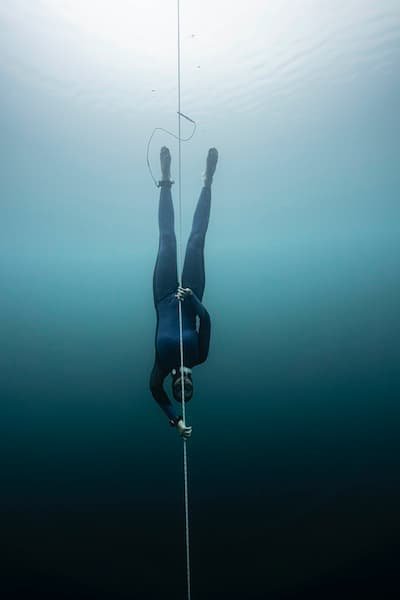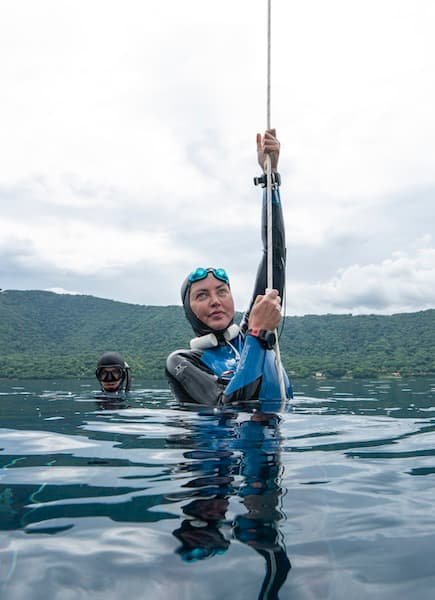
 Nick Pelios
Freediver, Creator
Nick Pelios
Freediver, Creator

 Nick Pelios
Freediver, Creator
Nick Pelios
Freediver, Creator
Lilly Crespy doesn’t hesitate when asked about the most important part of freediving. It’s not the gear, not the breath-hold, not even the hours in the water. For her, it all starts in the mind.
As an AIDA instructor trainer and Alchemy ambassador, Lilly has worked with countless freedivers over the years. She’s seen how people pour themselves into physical preparation, gym sessions, depth training, CO₂ tables, while often neglecting the one element that influences every dive from start to finish: mindset.
Mental preparation, she believes, isn’t a luxury. It’s the foundation of safe, sustainable progression. And it begins with periodization, not just to avoid injury or burnout, but to maintain motivation and build confidence over time. Structured training that includes planned rest is, in her view, the first mental skill a freediver should master. It sends a message to the body and the brain: you’re in control, and you're not here to chase depth at all costs.
Breath-hold diving goes against everything the brain is programmed to protect. Not breathing, being underwater, sinking deeper, these are all red flags to our primal instincts. So Lilly works with her students to retrain the nervous system, gradually replacing fear responses with familiarity and positive association.
Visualization is one of her core tools. But not just any visualization, she teaches divers to build mental movies of dives that are not only successful but enjoyable. The more vividly and consistently you imagine feeling calm, strong, and in control, the more your body begins to believe that’s what diving feels like.
She also introduces anchoring and belief-shifting practices to help divers let go of the internal narratives that hold them back. Those stories, “I can’t,” “I’m not ready,” “What if I fail?”, are often the true limits, not the physical ones. Once they’re replaced with trust, clarity, and presence, everything else starts to flow.

Lilly often reminds her students that physiology and psychology are inseparable. How you hold your body, how you breathe, whether you’re tense or relaxed, these are not just reactions to how you feel. They’re also instructions to your nervous system.
Even something as small as smiling before a dive can soften the edges of stress. Adjusting posture, focusing on relaxed movement patterns, and speaking calmly to yourself all send signals that the situation is safe. These cues matter. They help you shift from panic to poise before stress even has the chance to build.
Relaxation isn’t a tool you pull out only at the bottom of a dive. It’s something you practice on land until it becomes second nature in the water. Whether you’re in a static hold or dropping into free fall, knowing how to bring yourself back into a calm state is one of the most important mental skills in a freediver’s toolkit.

Freediving demands focus like few other sports. Minutes of stillness. Complete immersion. No distractions. But presence doesn’t come naturally to most people. It has to be trained, just like any muscle.
Lilly encourages divers to build their attention span through meditation, breath awareness, and techniques designed to reduce mental clutter. Not because a blank mind is required, but because a focused one is safer. A diver who can stay in the moment is a diver who knows when to turn, when to push, and when to listen to the quiet signals of the body.
Mental preparation, in the end, is not a separate skill. It’s the thread that runs through every part of freediving, from planning and training, to execution and recovery. It’s not always visible. It doesn’t show up on a dive watch. But it’s there in every smooth descent, every relaxed exhale, every dive that feels like it belonged to you before it even began.
And according to Lilly Crespy, that’s where the real dive begins.